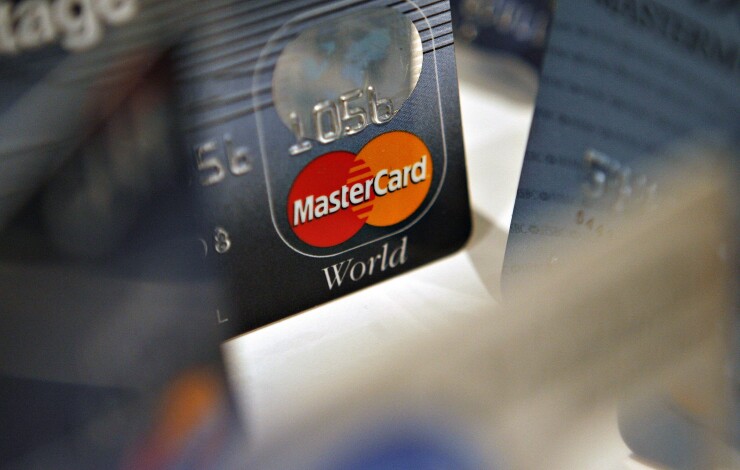Payment companies' efforts to modernize by connecting systems through partnerships and acquisition has invariably caused a chain reaction of competitive issues in the eyes of regulators.
Mastercard currently faces this dilemma in its pursuit of VocaLink through a $920 million acquisition announced last year that recently prompted objections from the U.K.'s top competition authority.
Observers say the case underscores the difficulty of balancing payment companies’ need to connect systems to streamline and speed up payments, without giving individual operators too much market power. VocaLink's activities over the past decade illustrate this balancing act.

When payment services companies Voca and Link merged in 2007, the combination looked to some like a key example of the payments industry’s push to modernize, with the new entity promising to focus on real-time payments with a pan-European vision.
VocaLink brought together forces that could push development of new seamless payments technology ahead, with Voca already processing 90% of U.K. workers’ salaries and Link operating one of the biggest international ATM networks.
But VocaLink's ownership by a group of U.K. banks looked too cozy to U.K. regulators, who last year urged the banks to divest ownership, prompting the latest chapter: Mastercard announcing plans last year to
Early this year the U.K. Competition and Markets Authority (CMA)
The CMA asked Mastercard to propose its own possible remedy to potential competition issues by Jan. 11; neither Mastercard nor the CMA have responded to inquiries about the progress of those discussions.
VocaLink’s technology powers the Faster Payments system and Zapp mobile service, and 13 banks are shareholders. Four of the largest of those banks—Barclays, HSBC, Lloyds Banking Group and Royal Bank of Scotland—own about 80% of the VocaLink.
In addition to processing the vast majority of U.K. workers’ salaries, VocaLink also handles more than 70% of household bills and almost all state benefits.
Mastercard covets VocaLink because the faster payments and Zapp services can benefit Mastercard’s existing initiatives to enable more secure and seamless payments, including across borders. VocaLink’s assets also could help Mastercard offset the effects of Visa’s dominant share of debit cards in the U.K.
Any remedies that might separate Link from VocaLink could possibly hobble broad industry efforts to modernize payments, says Gareth Lodge, a London-based senior analyst with London-based Celent.
“The other challenges here are that the U.K. Faster Payments network uses both Link and Voca technology, which is why the two companies originally merged,” Lodge noted. “Separating them could cause more costs and challenges, raising questions about which parts of the company are more important.”
The CMA’s objections are only the most recent in a series of actions that began months ago concerning VocaLink’s marketplace dynamics.
The U.K.’s Payment Systems Regulator (PSR) formed in 2014 partly to provide careful consideration of how emerging payments technologies functioned in the marketplace, and when the agency
The PSR in February of last year announced that it recommended VocaLink’s banks
It’s not clear how all parties might be satisfied in the CMA’s objections to Mastercard’s purchase of VocaLink, Lodge said.
“It’s understandable that policy changes over time,” Lodge said, noting that years ago U.K. regulators indirectly caused both Link and Voca to operate as for-profit, rather than nonprofit, companies. This ultimately led to their merger.
“More recently, (competition authorities) wanted VocaLink separated from bank ownership, yet VocaLink now is potentially being sold to a much more dominant player. Instead of a dozen or so (bank) owners where no one bank can hold a dominant position, VocaLink is being sold to a single entity that already has a large footprint in the U.K. … and it’s not clear to all participants in the market that this will address the concerns that triggered the sale,” Lodge said.
In an earlier





